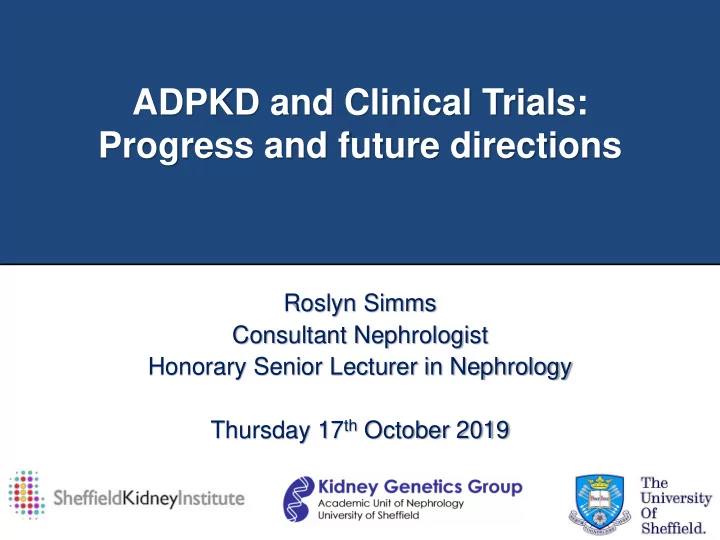

ADPKD and Clinical Trials: Progress and future directions Roslyn Simms Consultant Nephrologist Honorary Senior Lecturer in Nephrology Thursday 17 th October 2019
Autosomal Dominant Polycystic Kidney Disease (ADPKD) ADPKD • Commonest inherited kidney disease • Progressive cyst development & growth • 3 rd commonest cause of renal failure (UK) Normal
Pathogenesis of ADPKD Chang, BJCP 2013
Challenges of clinical trials in ADPKD • Progression highly variable Barua, JASN 2009 80yr 68yr 56yr Cornec-Le Gall JASN 2013 • Monitoring progression: ESRF eGFR late marker
Total kidney volume (TKV) in ADPKD • Gradual cyst development/years TKV • TKV clinically relevant, marker of progression : 1981: 1 st (n43, CT) correlated 1/CrCl (Thomsen)
Consortium for Radiologic Imaging Studies of PKD CRISP : (multicentre, central analysis) NIDDK funded Annual MRI, 241 patients, 16-45yrs, eGFR>70ml/min Aim - reliably & accurately measure TKV and TCV - detect change (sequential scans) - is TKV, TCV associated with GFR CRISP1 (Chapman 2003) : TKV measurement reliability 99.9% (phantoms) 0.998 (pts) TKV greater with age, hypertension, UAE TKV inversely correlated with GFR (iothalamate)
Total Kidney Volume (TKV) as an endpoint? CRISP after 3yrs • Baseline TKV predicts future rate of increase • TKV increased: 5.3%/year, greater if PKD1 CRISP after 8yrs CRISP, Grantham, NEJM 2006 • Increasing TKV precedes change in eGFR 1.0 htTKV Change from baseline 0.5 CRISP, Chapman, CJASN 2012 0.0 GFR -0.5 -1.0 0 1 2 3 4 6 8 Follow up (yrs)
Trials in ADPKD involving TKV 2007: PKD Foundation & FDA: Accept kidney growth as 1 outcome to encourage industry for PKD drug development 2009: Database and data standards to build evidence Chapman, HALT CJASN 2010 • Target hypertension (NIH/NIDDK) • RAAS blockade: Dual vs mono ACEi/ARB • Early: <50yrs, eGFR>60ml/min • 2 BP targets, 1º: annual % change in TKV • 5yrs (MRI: 0, 1, 2, 5yrs)
HALT PKD results • 553 patients completed trial Schrier, NEJM 2014 • Benefit of change in TKV did not translate to eGFR • Time lag? Haemodynamic?
TEMPO 3:4 1 st effective (specific) therapy in ADPKD T olvaptan E fficacy and safety in M anagement of P KD and O utcomes • Tolvaptan/Placebo for 3yrs (double blind) • 1445 patients, 18-50yrs • Normal kidney function (>60ml/min/ 1.73m 2 ) • TKV>750mL/m ( burden of disease ) 1 : Change in kidney volume (0, 1, 2, 3yrs) • 2 : Change in eGFR, renal pain, hypertension • Completed Jan 2011
TEMPO 3:4 RCT: 1 st effective therapy in ADPKD Tolvaptan: 2.8%pa Tolvaptan: -2.7ml/min/pa Placebo: 5.5%pa Placebo: -3.7ml/min/pa 30% slower eGFR 50% slower TKV Torres NEJM 2012
Eligibility for Tolvaptan in ADPKD NICE, Oct. 2015 • Stage 2-3 CKD (eGFR 30-89ml/min) • Evidence of “rapid disease progression” • Biomarker Qualification: • EMA: Nov. 2015 and FDA: Sept. 2016 • COU: baseline TKV predicts pts at high risk of progression (+age, eGFR)
US Regulations for Drug Approval Traditional • Endpoints: ESRF, survival, Accelerated – used in ADPKD • For drugs treating serious/life threatening disease • Surrogate endpoint • Requires additional post marketing confirmatory trial REPRISE: Replicating evidence of preserved renal function: an investigation of Tolvaptan’s safety & efficacy RCT, eGFR 25-65 (<55yrs) or 25-44 (56-66yrs), No MRI Torres, NEJM, 2017
Summary of recent trials in ADPKD using TKV N>100 *p<0.05 Ong et al, Lancet 2015
Future Trials in ADPKD • Enrich trial population for “an event” (timescale) • Mayo Imaging Classification: baseline TKV predicts progression 1A: <1.5% 1B: 1.5-3% 1C: 3-4.5% 1D: 4.5-6% 1E: >6% Irazabal, JASN 2014
Future Trials in ADPKD - outcomes • Ensure high performance, standardised methods for measuring serial TKV • Automated quantification of TKV Deep learning network, n=500. TKV: Bias <0.1% Precision 2.7 95% CI -5.4-5.4 Van Gastel, JASN 2019
Future Directions • Target earlier stage ADPKD, trial populations with preserved eGFR • Identify complimentary early surrogate endpoints eg functional MRI techniques • Collaborative multicentre funding (especially if absence of pharmaceutical sponsor)
Summary • Variability in progression of ADPKD requires risk stratification of patients to enrich clinical trial populations, optimising events during a trial • Extensive evidence supports increased TKV is clinically relevant and currently the earliest prognostic biomarker in ADPKD approved by the EMA and FDA • There is scope for the development of additional early surrogate functional MRI biomarkers in ADPKD
Acknowledgements Patients Peter Metherall Jonathan Taylor Des Ryan Trushali Doshi Tess Harris Professor Albert Ong
Thank you
Recommend
More recommend